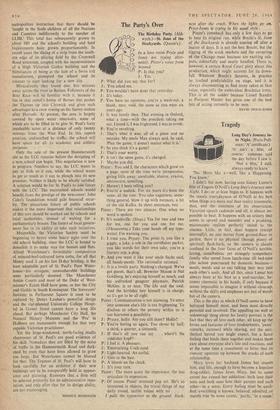The Party's Over
The Birthday-Party. (Ald- D03 wych.)—St. Joan of the Stockyards. (Queen's.) In a bare room Pryce and Jones are typing alter- nately. Pinter's voice from beyond.
P: Is that you?
J: Yes.
P: What did you say that for?
J: You asked me.
P: You wouldn't have done that yesterday. J: It's today.
P: You have no opinions, you're a wash-out, a blank, zero, void, the same as you were six years ago.
J : It was lovely then. That evening in Oxford, what a time—with the president taking me out. I loved it, I was frightened, I was in revolt. P: You're revolting.
J : That's what it was, all of a piece and no mistake. My uncle Max always said, he said, `Play the game, it doesn't matter what it is.' P: So you think it's a game?
I: That's your worry.
P: It isn't the same game, it's changed.
J: Maybe you did.
Pinter: You and I, the characters which grow on a page, most of the time we're inexpressive, giving little away, unreliable, elusive, evasive, obstructive, unwilling.
J: Haven't I been telling you?.
P: You're a nudnik. For six years it's been the same, all, the time. You take vagueness, some- thing general, blow it up with menaces, a bit of the old Kafka. In short sentences, too.
Pinter: There are two silences. One when no word is spoken.
P: It's vaudeville. (Sings.) Tea for two and two for tea, one for you and one for me. (Threatening.) Take your hands off my type- writer, I'm warning you.
I: I trust you, Prycey. The point is, you like a giggle, a joke, a sob in the cornflakes packet, you like words for their own sake, you're a literary sop, a plug.
P: And you want it like your uncle Sachs said, all handy-pandy. The rationalist rationed.
J: It is a lovely party. Nothing's changed. We've got guests, that's all. Brewster Mason is Nat Goldberg, he's enjoying himself so much, and his unfrocked gangster playmate, Patrick McGee, is so nice. The life and the soul. And the birthday boy himself is in charge, so it's got to be all right.
Pinter: Communication is too alarming. To enter into someone else's life is too frightening. To disclose to others the poverty within us is too fearsome a possibility.
J: Prycey, hullo. Are you still there? Hullo?
P: You're boring us again. Too clever by half, a third, a quarter, a sixteenth.
J: If that's all you can say . . . where's the yiddisher kopf?
P: I feel it. A pleasure..
J: Entertaining. Cock-eyed.
P: Light-hearted. An earful.
J : Gets in the hair.
P: A bloom on the cheek.
J: It's your turn.
Pinter: The more acute the experience, the less articulate its expression.
P: Of course Pinter invented pop art. He's so interested in objects, the trivial things of our daily round, tactile values with no . . .
1 pulls the typewriter to the ground. Dark- ness after the crash. When the lights go on. Pryce-Jones is typing in his usual style : Pinter's comeback has only a few days to go to beat its original run, while Brecht's St. Joan of the Stockyards is already coming off after a matter of days. It is not the best Brecht, but the rigging of the stock markets and the cornering of the Chicago meat business are exciting sub- jects, colourfully and neatly handled. There is, however, a certain Royal Court piety about this production, which might account for its down- fall. Whatever Brecht's theories, in practice he loathed predictability on stage, and it is always disconcerting to find irony taken at face value, especially the ambivalent Brechtian irony. This is all the sadder because Lionel Stander as Pierpont Mauler has given one of the best bits of acting currently to be seen.
DAVID PR YCE-JONES


































 Previous page
Previous page